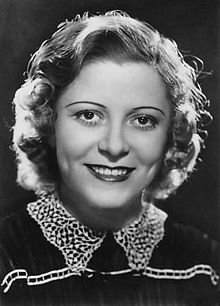Maria Cebotari
| Maria Cebotari | |
|---|---|

Maria Cebotari
|
|
| Born | 10 February 1910 Chișinău, Bessarabia Governorate, Russian Empire (now Moldova) |
| Died | 9 June 1949 (aged 39) Vienna, Austria |
| Nationality | Romanian |
| Occupation | Operatic soprano |
| Years active | 1931–1949 |
| Spouse(s) |
Alexander Virubov (1929–1938) Gustav Diessl (1938–1948) |
Alexander Virubov (1929–1938)
Maria Cebotari (10 February 1910 – 9 June 1949) was a celebrated Romanian soprano and actress, one of Europe's greatest opera stars in the 1930s and 1940s.
Beniamino Gigli considered Cebotari one of the greatest female voices he ever heard.Maria Callas was compared to her, and Angela Gheorghiu named Maria Cebotari among the artists she admires the most.
Her funeral was "one of the most imposing demonstrations of love and honor any deceased artist has ever received" in the history of Vienna, with thousands of people attending.
Cebotari was born at Chişinău, studied singing at the Chişinău Conservatory, and in 1929 joined the Moscow Art Theater Company as an actress. Soon she married the company's leader, Count Alexander Virubov.
Moving to Berlin with the company, she studied singing with Oskar Daniel for three months and made her debut as an operatic singer by singing Mimi in Puccini's opera La Bohème at Dresden Semperoper on 15 March 1931. Bruno Walter invited her to the Salzburg Festival, where she sang Euridice in Gluck's opera Orfeo ed Euridice.
In 1935, she sang the part of Aminta in the world premiere of Richard Strauss' opera Die Schweigsame Frau under Karl Böhm at Dresden Semper Opera House. Strauss advised her to move to Berlin, and in 1936 she joined the Berlin State Opera, where she was a prima donna until 1946. That year, she sang Susanna in Le Nozze di Figaro, Zerlina in Don Giovanni, and Sophie in Der Rosenkavalier for Dresden Semper Opera Company's performances at Covent Garden Royal Opera House of London. From then on, she appeared at many great opera houses including Vienna State Opera and La Scala Opera House of Milan.
...
Wikipedia
